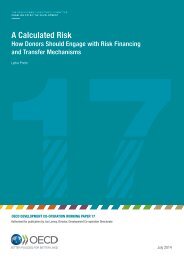UNIVERSITY
Livelihood_resilience_working_paper22
Livelihood_resilience_working_paper22
You also want an ePaper? Increase the reach of your titles
YUMPU automatically turns print PDFs into web optimized ePapers that Google loves.
Gibika project <br />
Gibika and the Resilience Academy <br />
A climate-‐resilient and sustainable future for people in vulnerable countries starts with resilient <br />
livelihoods. There is an urgent need to turn knowledge about livelihood threats, shocks, trajectories <br />
and opportunities into operable solutions. <br />
The aims of the Gibika research-‐to-‐action project are to advance the scientific understanding of <br />
livelihood resilience in Bangladesh, and to apply conclusions towards community-‐led solutions that <br />
improve the living conditions of vulnerable people. When livelihood systems are not resilient, <br />
environmental shocks can have long-‐term impacts on human well-‐being and development goals. By <br />
implementing community-‐led action, this project can promote livelihood resilience, and sustainable <br />
development. Gibika is a five-‐year research-‐to-‐action partnership between International Centre for <br />
Climate Change and Development (ICCCAD), United Nations University Institute for Environment and <br />
Human Security (UNU-‐EHS) and Munich Re-‐Foundation (MRF) with the objective of improving the <br />
living conditions of people in our project sites in Bangladesh. To inform future interventions that aim <br />
at enhancing livelihood resilience in risk-‐prone environments, the project will share the lessons <br />
learnt in the research-‐to-‐action process with academic audiences as well as practitioners. <br />
Resilience Academy <br />
The annual Resilience Academy (2013-‐2017) is a platform for connecting communities of expertise <br />
(early phase practitioners, academics, and policy analysts), examining livelihood resilience in the face <br />
of local and regional environmental threats. Journal articles and policy briefs produced in the <br />
context of the academy aim at influencing big policy milestones in the area of Climate Change <br />
Adaptation, Disaster Risk Reduction, Humanitarian Response and Development in 2015 and beyond. <br />
The first Resilience Academy took place in Savar, Bangladesh in 2013 and the second near Munich, <br />
Germany in 2014. They explored livelihood resilience amidst global transitions. They brought <br />
together 25 researchers and practitioners from 15 countries as well as field facilitators from <br />
Bangladesh and two senior experts. The third Resilience Academy took place near Dhaka, <br />
Bangladesh from 6-‐12 September 2015 on the topic “Enhancing resilience to minimize loss and <br />
damage – providing knowledge for the UNFCCC,” and the fourth Resilience Academy will be held <br />
near Munich, Germany from 4-‐10 September 2016. <br />
The Resilience Academy builds on a long-‐standing partnership between MRF and UNU-‐EHS who <br />
together organized seven Summer Academies and a keystone conference bringing all the Summer <br />
Academy participants together one last time under the aegis of the Chair on Social Vulnerability. <br />
For more information, please visit: <br />
-‐ http://ehs.unu.edu/research/gibika.html#outline <br />
-‐ http://icccad.net/gibika/ <br />
-‐ http://munichre-‐foundation.org/home/DisasterPrevention/Gibika-‐Bangladesh.html



